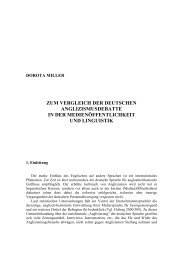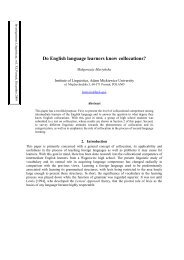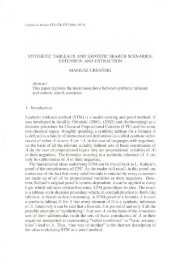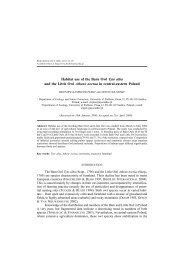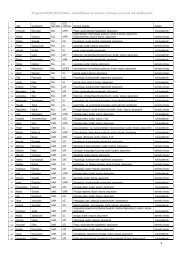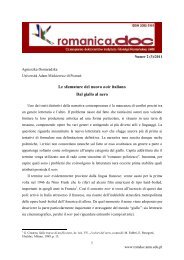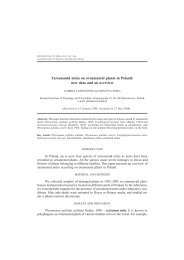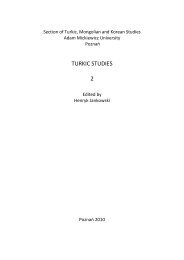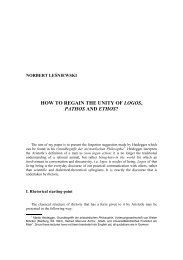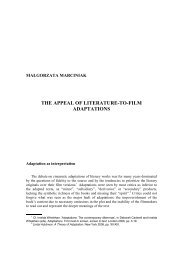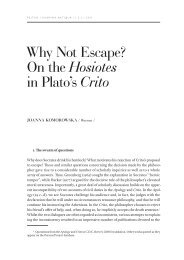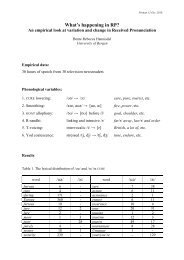Ticks (Acari: Ixodida) parasitizing birds (Aves) in Poland
Ticks (Acari: Ixodida) parasitizing birds (Aves) in Poland
Ticks (Acari: Ixodida) parasitizing birds (Aves) in Poland
You also want an ePaper? Increase the reach of your titles
YUMPU automatically turns print PDFs into web optimized ePapers that Google loves.
148 K. Siuda, A. Majszyk and M. NowakMATERIALS AND METHODSData from own research and from works of other authors on ticks <strong>parasitiz<strong>in</strong>g</strong><strong>birds</strong> <strong>in</strong> <strong>Poland</strong> and published until the end of 2004 were analysed (JAROCKI 1825,SCHULZE & SCHLOTTKE 1929, LEHNERT 1933, SCHULZE 1933, RAFALSKI 1953, 1956,LACHMAJER et al. 1956, EMCHUK 1960, KOLPY 1963, KOZ£OWSKI et al. 1964, LACH-MAJER 1967, 1977, PATAN 1969, GRZYWIÑSKI 1970, KAHL 1971, GRZYBEK et al.1973, GRZYWACZ & KU MICKI 1973, WEGNER 1973, ¯UKOWSKI & BITKOWSKA 1973,FILIPPOVA 1977, 1997, KACZMAREK 1977, 1982a, b, 1988, NOSEK & FOLK 1977,SIUDA & DUTKIEWICZ 1979, SIUDA et al. 1979, 1982, KOLONIN 1983, SIUDA 1984,1985, 1986a, b, 1991, 1993, HAITLINGER 1987, BUCZEK 1991, SIUDA & SZYMAÑSKI1991, BUCZEK & SOLARZ 1993). Moreover, some reports from outside <strong>Poland</strong> wereused (EMCHUK 1960, NOSEK & FOLK 1977, FILIPPOVA 1977, 1997, KOLONIN 1983).RESULTSOn the basis of the analysed data, we propose a new division of tick species ofthe Polish fauna accord<strong>in</strong>g to their host specificity when <strong>parasitiz<strong>in</strong>g</strong> <strong>birds</strong>:1. Exclusively ornithophilous ticks (with very narrow host specificity and <strong>parasitiz<strong>in</strong>g</strong><strong>birds</strong> only): Ixodes (Pholeoixodes) arboricola Schulze et Schlottke, 1929,Ixodes (Pholeoixodes) lividus Koch, 1844, Ixodes (Scaphixodes) caledonicus Nuttall,1910, Ixodes (Trichotoixodes) frontalis (Panzer, 1798).2. Generally ornithophilous ticks (<strong>in</strong>habit<strong>in</strong>g <strong>birds</strong> as their ma<strong>in</strong> hosts, butsometimes attack<strong>in</strong>g other vertebrates): Argas (Argas) polonicus Siuda, Hoogstraal,Clifford et Wassef, 1979, Argas (Argas) reflexus (Fabricius, 1794), Ixodes (Ixodes)festai Rondelli, 1926. The last species is not native to <strong>Poland</strong> (SIUDA 1993).3. Partly ornithophilous ticks (immature stages <strong>parasitiz<strong>in</strong>g</strong> mostly <strong>birds</strong>, butimag<strong>in</strong>es attack<strong>in</strong>g other land vertebrates and humans): Ixodes (Ixodes) persulcatusSchulze, 1930, Ixodes (Ixodes) ric<strong>in</strong>us (L<strong>in</strong>naeus, 1758), Haemaphysalis (Aboimisalis)punctata Canestr<strong>in</strong>i et Fanzago, 1877, Haemaphysalis (Haemaphysalis) conc<strong>in</strong>naKoch, 1844, Hyalomma (Euhyalomma) marg<strong>in</strong>atum Koch, 1844. The last speciesis not native to <strong>Poland</strong> (SIUDA 1993).4. Accidentally ornithophilous ticks (<strong>parasitiz<strong>in</strong>g</strong> ma<strong>in</strong>ly vertebrate groups otherthan <strong>birds</strong>, but cases of their parasitism on <strong>birds</strong> have been also reported): Ixodes(Exopalpiger) trianguliceps Birula, 1895, Ixodes (Pholeoixodes) crenulatus Koch,1844, Ixodes (Pholeoixodes) hexagonus Leach, 1815, Ixodes (Ixodes) apronophorusSchulze, 1924, Dermacentor (Dermacentor) reticulatus (Fabricius, 1794), Dermacentor(Serdjukovia) marg<strong>in</strong>atus (Sulzer, 1776), Rhipicephalus (Rhipicephalus) rossicusJakimov et Kohl-Jakimova, 1911. The last 2 species are not native to <strong>Poland</strong>(SIUDA 1993).5. Non-ornithophilous ticks (never reported to parasitize <strong>birds</strong>): Carios (Carios)vespertilionis Latreille, 1796, Ixodes (Pholeoixodes) rugicollis Schulze etSchlottke, 1929, Ixodes (Pomerantzevella) simplex Neumann, 1906, Ixodes (Eschatocephalus)vespertilionis Koch, 1844.We also established current lists of bird species serv<strong>in</strong>g as hosts for <strong>in</strong>dividualtick species <strong>in</strong> <strong>Poland</strong>, accord<strong>in</strong>g to the above classification:




